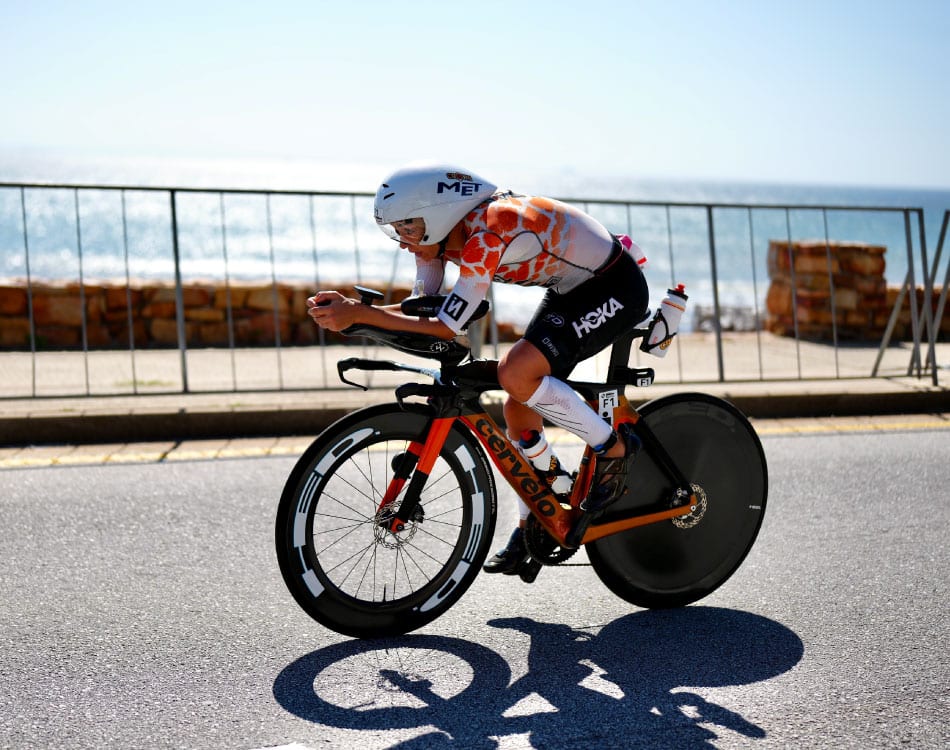A strong athlete is an efficient athlete, but there are differing opinions on the best ways for endurance athletes to develop sport-specific strength and boost performance.
A large body of research1, 2 affirms the benefits associated with strength training for endurance performance.
While the benefits are clear, not all forms of strength training are the same, and there are differing schools of thought about the best types of training for endurance athletes, specifically set and rep structures and the weights they lift.
READ MORE | This Is Why Endurance Athletes Should Always Include Strength Training
Lift heavy
In this regard, the repetition continuum theory suggests that low-load, high-rep training increases muscular endurance, which is why the conventional approach among endurance athletes is 12-15 reps using a lighter weight.
However, more research is finding that the opposite end of the repetition continuum of 3-5 reps is where athletes develop maximal strength that can deliver significant performance benefits, often in excess of the conventional approach (moderate load training, which optimises increases in muscle size, or hypertrophy, is not favoured for endurance athletes as it increases body weight).
In one such study3 published in the Scandinavian Journal of Medicine and Science in Sports, researchers concluded that “strength training can lead to enhanced long-term (>30 min) and short-term (<15 min) endurance capacity both in well-trained individuals and highly trained top-level endurance athletes, especially with the use of high-volume, heavy-resistance strength training protocols.”
The researchers attributed the enhancements in endurance capacity to “training-induced increases in the proportion of type IIA muscle fibers as well as gains in maximal muscle strength (MVC) and rapid force characteristics (rate of force development), while likely also involving enhancements in neuromuscular function.”
READ MORE | Pushing The Threshold: The Benefit For Lactate-Guided Training For Endurance Athletes
Minimum effective dose
In terms of the number of sets and sessions athletes need a week, a novel research paper that tried to determine the most time-efficient training programs for strength and hypertrophy offers some insights into the minimum effective dose when it comes to weight training.
In the study4 published in the journal Sports Medicine, the researchers determined that “strength training can be made more time-efficient by prioritizing bilateral, multi-joint movements through a full range of motion.”
More importantly, they determined that weekly training volume is more important than training frequency. They recommended “performing a minimum of 4 weekly sets per muscle group using a 6–15 RM loading range.”
Based on the other research on the topic, endurance athletes would get the greatest strength benefit from lifting heavier weights at the lower end of the repetition scale.
READ MORE | Time For Endurance Athletes To Focus On Often Neglected Areas
Combine and conquer
But rather than an either-or decision, leading strength and conditioning researcher, Brad Schoenfeld, Ph.D, suggests that a combination might offer the best results.
In a research paper4, Schoenfeld and fellow author Jozo Grgic, proposed a new paradigm based on emerging evidence whereby athletes achieve adaptations across a wide spectrum of loading zones.
Based on this model, endurance athletes should combine:
- A low repetition scheme with heavy loads: 1-5 repetitions per set with 80% to 100% of 1-repetition maximum (1RM) to optimise strength increases.
- A high repetition scheme with light loads: 15+ repetitions per set with loads below 60% of 1RM to optimise local muscular endurance improvements.
READ MORE | 3 Steps To Boost Post-Workout Recovery For Endurance Athletes
Discipline and consistency
Ultimately, any type of strength training will deliver benefits for endurance athletes, with a comprehensive and periodised approach that combines set and rep structures that develop both maximal strength and muscular endurance the best option.
However, as with all training programs, success and effectiveness ultimately hinges on adherence.
Athletes that work hard, train smart and remain consistent over at least 12 weeks6 will reap the performance benefits and lower their injury risk.
6 research-backed insights
A meta-analysis6 published in the International Journal of Sports Physiology and Performance reviewed multiple studies to determine the best strength training principles for endurance athletes and came up with this list:
- Utilise strength training at least 2 times per week.
- Use a periodised training program that progressively increases one or more training variables such as volume and/or intensity.
- Combine heavy strength training with plyometrics.
- Do not train to failure. Combine maximal and sub-maximal training sessions.
- Select exercises that are specific to the sport, do not just perform functional lifts.
- Programs lasting 12 or more weeks presented the best results.
References:
- Pablo Prieto-González1, Jaromir Sedlacek. Effects of Running-Specific Strength Training, Endurance Training, and Concurrent Training on Recreational Endurance Athletes’ Performance and Selected Anthropometric Parameters. Int J Environ Res Public Health. 2022 Sep; 19(17): 10773. Published online 2022 Aug 29. doi: 10.3390/ijerph191710773
- Kris Beattie, et al. The Effect of Strength Training on Performance in Endurance Athletes. Sports Medicine. February 2014. 44(6):845-865. DOI:10.1007/s40279-014-0157-y
- Per Aagaard, J L Andersen. Effects of strength training on endurance capacity in top-level endurance athletes. Scandinavian Journal of Medicine and Science in Sports. October 2010. 20 Suppl 2(s2):39-47. DOI:10.1111/j.1600-0838.2010.01197.x
- Iversen, V.M., Norum, M., Schoenfeld, B.J. et al. No Time to Lift? Designing Time-Efficient Training Programs for Strength and Hypertrophy: A Narrative Review. Sports Med 51, 2079–2095 (2021). https://doi.org/10.1007/s40279-021-01490-1
- Brad J. Schoenfeld, Jozo Grgic. Loading Recommendations for Muscle Strength, Hypertrophy, and Local Endurance: A Re-Examination of the Repetition Continuum. Sports (Basel). 2021 Feb; 9(2): 32. Published online 2021 Feb 22. doi: 10.3390/sports9020032
- Nicolas Berryman, Carl Binet, et al. Strength Training for Middle- and Long-Distance Performance: A Meta-Analysis. International Journal of Sports Physiology and Performance. doi.org/10.1123/ijspp.2017-0032















